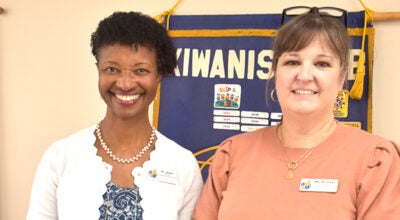Circle of Care to hold human trafficking presentation
Published 11:00 am Friday, January 14, 2022
|
Getting your Trinity Audio player ready...
|
Human trafficking is all around us but can be difficult to detect. And even when it’s discovered, it isn’t always obvious how one should respond. Circle of Care Center for Families will be holding Human Trafficking 101 to teach community members what is and isn’t human trafficking, to make them aware of local human trafficking, how to respond to human trafficking and how to keep their families and communities safer.
The free event will take place on Thursday, Jan. 27 from 7 p.m. to 8:30 p.m. at the Church of Jesus Christ of Latter-day Saints at 1802 S 5th Street in Lanett.
Adrian Carpenter is a program supervisor for Circle of Care and the coordinator for Renew Hope 85, one of the sponsoring organizations for the event.
He said Circle of Care Center for Families started Renew Hope 85 about six years ago.
“We’ve started doing a huge community-wide presentation at a local church,” he said. “And since then, we’ve followed that up with trainings for law enforcement, for nurses, school teachers [and] service providers about really what to look for as it relates to human trafficking and even how to intervene or what to do when we encounter human trafficking.”
Carpenter said Renew Hope 85 teaches social workers and law enforcement how to safely remove someone from a human trafficking situation.
As for the general public, he said the organization teaches them how to identify human trafficking and report it to law enforcement and the national hotline.
A heat map provided by the U.S. National Human Trafficking Hotline shows that Atlanta is a major hub for human trafficking, Carpenter said.
“And what we’ve seen is that basically, human trafficking follows interstate lines out of Atlanta whether it be I-20 to Birmingham or I-85 toward Montgomery,” he said. “There are circuits that traffickers carry victims on. And so, they go from one city to another city to another city, basically a loop back to the originating city.”
Carpenter said Atlanta is a red zone on the heat map, meaning it has high trafficking activity, while the area from LaGrange to Opelika is an orange zone.
“The University of Alabama did a study in Alabama about two years ago, and they believe that in any month, there’s about 5,000 people being trafficked in Alabama every month,” he said.
Sex trafficking may be more likely to be reported than labor trafficking, Carpenter said, but both are an issue.
“We feel like there’s probably more labor trafficking than we know about, but the data we have right now is linked toward trafficking,” he said.
While anyone can become a victim of human trafficking, some people are more vulnerable than others.
“A lot of our numbers are runaways that run away to Birmingham or Atlanta or someplace, and they get there and realize they don’t have a way to feed themselves or care for themselves, and they become very vulnerable. People with a history in the juvenile justice system have a higher correspondence. Even in the foster care system, there’s a higher chance.”
Poverty and substance abuse are also factors that can make people vulnerable to human trafficking, Carpenter said. He explained that a family member with a substance abuse issue may sell a family member to get money for drugs.
Carpenter warned that it’s never a good idea for someone who isn’t a law enforcement professional to try to get someone out of a human trafficking situation, as it can put both them and the trafficking victim in danger. He said to always call 911 or the U.S. National Human Trafficking Hotline to report a case of human trafficking.
You can contact the U.S. National Human Trafficking Hotline by calling 1-888-373-7888, by texting “BeFree” (233733), via live chat or by email. Services are available toll-free 24 hours a day, seven days a week. Visit https://humantraffickinghotline.org for more info.




